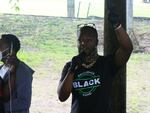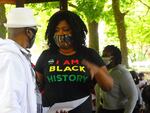It started off as a social media post and crowdfunding campaign in early June. In the wake of the police killing of George Floyd, Cameron Whitten was looking for ways to support his community. The idea quickly grew into an emergency aid fund that, over the past several weeks, has raised nearly $1.2 million for Black families in the Portland metro area from nearly 13,000 donors.
Whitten and Salomé Chimuku co-founded the Black Resilience Fund to provide emergency financial support to the Black community as it dealt with what some have called two overlapping pandemics: coronavirus and systemic racism.

Cameron Whitten speaks at a Black Resilience Fund event at Northeast Portland’s Irving Park. Whitten is the co-founder of the fund which provides immediate financial support to Black Portlanders.
Courtney Sherwood/OPB
“Cameron was feeling very similar to myself, as well as many other Black Portlanders: just at a loss of how to pay bills in this time of COVID-19, and dealing with the murder of George Floyd and Breonna Taylor. And also going through, you know, that COVID loneliness,” Chimuku told OPB’s “All Things Considered.”
Whitten started by making a Facebook post, asking Black followers if they needed a bill paid or a meal provided, and encouraging non-Black followers to donate via cash apps to make it happen. It took off: Whitten said it raised $11,000 in the first day alone. A crowdfunding campaign started the next day immediately raised tens of thousands more.
Related: Systemic racism proclamation spurs cultural rift in rural Yacolt, Washington
One of the people who got a bill paid with those very first funds was Chimuku. As she talked with Whitten about the fundraising effort, she said she quickly realized what a big deal this could be, and that she could help.
“If you have people who are willing to donate money to Black Portlanders, and you’re like, at a loss for Black Portlanders, I will find some Black Portlanders for you!” Chimuku recalled telling Whitten.
She hit her networks and began helping to build a structure and volunteer base for the fund that quickly expanded from 100, to 400, to 900 volunteers.
“Lo and behold, it became this hydra that developed and grew arms and had multiple heads and facets,” Chimuku said.
The need is significant. As the Black community continues to be hit hard by the double impact of the coronavirus pandemic, pre-existing inequities are only exacerbated. With emergency closures affecting Black-owned small businesses and independent contractors — everyone from salon workers, to daycare providers, to restaurant owners, artists or drag performers — people are feeling the pressure of lost income, Chimuku said. Some people who’ve lost their jobs have been unable to get unemployment benefits, as the bills stack up.
“You add that stress with the stress of institutional racism, and being fearful to go outside — not only because of COVID, but due to police interactions — and you get folks in these really dark places who haven’t seen anyone for a while,” Chimuku said. Some people who come to them for help “are really craving just to be seen as human, and get some humanity back in their life.”
To qualify for support from the Black Resilience Fund, you only need to identify as Black or African and live in the Portland metro area. Chimuku said she and Whitten expanded beyond Multnomah County, including Washington and Clackamas counties, as well as Clark County, Washington.

Co-founder of the Black Resilience Fund, Salomé Chimuku, speaking with an attendee of a July event where volunteers conducted in-person intakes and distributed funds to Black Portlanders in need.
Courtney Sherwood/OPB
“We recognize that, with Portland’s historic gentrification, a lot of Black Portlanders unfortunately don’t live in Portland anymore because it’s not affordable,” Chimuku said. “We don’t want to create another barrier.”
Once you apply, a short video interview is set up with one of the fund’s intake volunteers, all of whom are Black Portlanders. Not just to confirm basic details of the application, but also to “give some care to them. Because a lot of these folks have not been able to gather in their churches, or in their playgrounds, in their schools, so they’re really missing that connection with other Black people,” Chimuku said. “Just a moment to see each other.”
Related: Night 57 of Portland protests brings 'refocus' and new limits on federal response
Payments — up to $300 — are processed and sent out from there. You can receive a payment through a cash app, or have it delivered to you as a paper check by another Black volunteer. “We want to make sure that while folks are engaging with us, that they’re meeting and seeing Black faces,” Chimuku said.
The goal is to provide low-barrier, no-strings-attached funding.
“We know that when folks sometimes give money away, they try to control what people can spend it on,” Chimuku said. “We feel that people know what their needs are … we give the money, and they can put it towards whatever they want.”
The founders said that flexibility is allowing people to address their most urgent needs.
“We’ve had recipients tell us they applied for funds because they were grieving, they were having mental health issues, and they couldn’t afford to take a day off, because they didn’t have any paid time off.” So, the fund paid for a day off work.
“I spoke with a woman who had to, unfortunately, fly for her oldest son’s funeral after having to pull the plug on him via Zoom. She had to choose between rent and going to that funeral, and we’re like, ‘Nope, you don’t have to make that choice anymore.’ And off she went,” Chimuku said.
She added that a mutual aid arm of the fund can provide non-monetary support too, powered by the donated skills of volunteers. “We have one volunteer who does staging for homes, who donated furniture to us. And we were able to furnish the apartment of this woman who was expecting her premature baby to come home any day, and didn’t have even a bed, because she had escaped domestic violence.”
The mutual aid program has also paired volunteers with some older people, or Black people with disabilities, who they now check in on regularly. “I know of a couple older seniors that do have a volunteer who comes by every week to see if they’re OK, and help them with stuff around the house,” Chimuku said. “It’s been really beautiful to see friendships blossom.”
While the fund itself was originally created as a one-off, its quick growth has underscored the need for ongoing aid to Chimuku and Whitten. They said they've taken steps to make it a longer-term project. They're working on making the fund a formal program of Brown Hope, a nonprofit organization of which Whitten is the executive director. Nonprofit status would help donors to the fund be able to write donations off on their taxes, Chimuku said. They've also created a Black Resilience Futures Fund, with a goal of bringing on paid staff to support the fund's work going forward.
The Black Resilience Fund “might look different than the way it looks right now, but keeping that same focus of taking care of folks that are local, and making sure that our neighbors are OK,” Chimuku said.
One more focus of the fund that’s important, Chimuku said, is that it continues to serve a wide diversity of Black and African-identifying people in the Portland metro area.
“The Black diaspora is beautiful. And oftentimes, we find that with Black people, we have to choose our identities,” she said.
Chimuku is African herself — a first generation Angolan-American daughter of immigrant parents — so, the fund has the capacity to conduct intake interviews in several languages. They serve many LGBT and non-binary people, because she and Whitten are both part of the LGBT community. “We’ve served Black Caribbeans, Haitians... because at the end of the day, all of these folks are Black. We’ve even served some folks who are parents of Black children.”
“We know that Black can take many different shapes and forms, and we think it’s all beautiful and deserves to be celebrated,” Chimuku said.
To hear the full OPB interview with Salomé Chimuku, use the audio player at the top of this page.